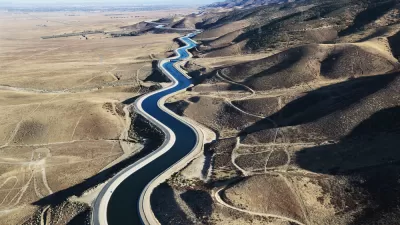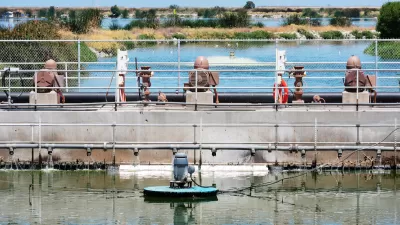As climate change and population growth strain fresh water resources, tactics from around the world provide universal lessons for building water-smart cities.

"A recent United Nations report on drought says climate change is increasing the frequency, severity and duration of droughts, which contribute to food insecurity, poverty and inequality," writes Chris Malloy. Additionally, the report points out, "drought has been the single longest-term physical trigger of political change in 5,000 years of recorded human history."
This, says Malloy, "calls for urgent action and a transformation in governance to manage modern drought risk more effectively." And although "[e]very place is different when it comes to preparing for these challenges … some tactics are universally applicable enough that they can be united into a blueprint for the water-smart cities of tomorrow." These tactics include recycling water, measuring usage–"if you cannot measure it, you cannot manage it"–and getting creative with techniques for collecting, storing, and conserving water, such as desalination, reclaimed wastewater, and futuristic options like Peru's fog-catching machines.
"There are also a host of potential policy changes, including requiring buildings to reuse water, encouraging greywater systems, and pursuing innovative financing, like the Green Stormwater Infrastructure Fee that Tucson charges residents," which "funds rainwater capture systems and the development of green spaces." But while "[c]ities can employ a range of solutions to tackle water scarcity … climate change remains the root cause of many looming water issues." To tackle it, "cities will need to become far more water efficient and invest in related education."
FULL STORY: How to Build a Water-Smart City

Alabama: Trump Terminates Settlements for Black Communities Harmed By Raw Sewage
Trump deemed the landmark civil rights agreement “illegal DEI and environmental justice policy.”

Study: Maui’s Plan to Convert Vacation Rentals to Long-Term Housing Could Cause Nearly $1 Billion Economic Loss
The plan would reduce visitor accommodation by 25% resulting in 1,900 jobs lost.

Planetizen Federal Action Tracker
A weekly monitor of how Trump’s orders and actions are impacting planners and planning in America.

Wind Energy on the Rise Despite Federal Policy Reversal
The Trump administration is revoking federal support for renewable energy, but demand for new projects continues unabated.

Passengers Flock to Caltrain After Electrification
The new electric trains are running faster and more reliably, leading to strong ridership growth on the Bay Area rail system.

Texas Churches Rally Behind ‘Yes in God’s Back Yard’ Legislation
Religious leaders want the state to reduce zoning regulations to streamline leasing church-owned land to housing developers.
Urban Design for Planners 1: Software Tools
This six-course series explores essential urban design concepts using open source software and equips planners with the tools they need to participate fully in the urban design process.
Planning for Universal Design
Learn the tools for implementing Universal Design in planning regulations.
Caltrans
Smith Gee Studio
Institute for Housing and Urban Development Studies (IHS)
City of Grandview
Harvard GSD Executive Education
Toledo-Lucas County Plan Commissions
Salt Lake City
NYU Wagner Graduate School of Public Service





























